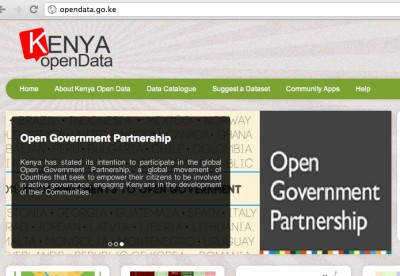Archive for the ‘web’ tag
Corporate Big Data Should Team Up With Public Open Data
In the early days of the Obama administration, the idea of open data was transitioned from lofty ideal to a reality pushing huge amounts of government-held data onto public portals. What started in the US, however, became a global process. Many governments have since committed themselves to provide data to their citizens through similar portals and to abide by the principles of open government.
This coming June, Kenya will celebrate one year of open data and a portal that has grown to over 220 datasets and a total of 500 data elements (datasets, documents, charts etc). A number of interesting mobile and web apps have been created that utilize the data such as MedAfrica. Although there have been signs of some cool apps, the number of apps I expected one year on haven’t quite materialized. However, 12 months is a short time and the next couple of years could very well see the rise of novel applications and highly innovative ways of communicating public data to citizens or using it to add value to commercial apps.
Now that the government is publishing data online and will continue to do so as legislation is enacted to further reinforce this, what’s next? I say MORE DATA. Not just government data. It’s time for corporate big data to join the party. The private sector has a wealth of data gathered everyday from citizens around the country. The level of intelligence contained in corporate data is so vast, fresh and detailed I’m certain the staff at the national bureau of statistics salivate at the thought of getting their hands on it. So do local small businesses and start-ups. Although the data held by a single corporate entity on its customers may be detailed and extremely valuable, it becomes even more valuable when taken together with data from other corporate entities. Taken together with public open data, this data is priceless.
Corporate open data could have immense impact on consumer/citizen facing organizations in both for-profit and non-profit sectors. Here are some possibilities that come to mind
- Banking data e.g. insights into average deposit size by county, number of business accounts, penetration of banking services by geographic location and population (percentage of population with bank accounts).
- Consumer goods sales e.g data on consumption of goods by location, trends, average price of most popular product type.
- Telecommunications e.g. Airtime sales by location, average size of airtime purchase, average call length by location, average number of text messages per person by location, number of subscribers accessing the internet via mobile or via other devices etc
- Disease prevalence e.g. data from private healthcare facilities could provide additional information on number of cases diagnosed by disease, location and trends beyond the diseases that are most commonly observed at public facilities.
In an age where information is king, helping communities empower themselves and turn their fortunes around requires access to the right information. Information that allows them to understand why their counties attract low investment, or whether they have the infrastructure to leverage for economic development, or what their political leaders can do to improve their quality of life. The answers to these and many other questions lie not just in government data but in corporate data as well.
Empowering citizens to become more active in their own governance is a key principle of open government and one which open data reinforces well. Empowered citizens make empowered customers and (I’m pretty certain) makes for good business somehow. It is possible that corporate social responsibility on this side of the industrial age may include providing data to the public that could help them change their world. Isn’t that a possibility East African businesses should consider investing in just as their governments are doing?
Content Strategy. The missing link in web strategy.
In his article on why brands are becoming media, Brian Sorlis makes a compelling case for why content strategy must be an integral platform on which we build our social media strategy. Many marketers don’t have a documented content strategy despite aggressively pursuing multiple social media channels as business enablers. These channels need content that is fresh, relevant and regular. This means we need a plan. Like magazines and newspapers, brands now need editors, writers and publishing calendars.
Writers need not be journalists contracted to develop and write articles for the brand on it chosen medium. They can be staff members who blog about their area of expertise. They can be brand evangelists who submit articles every so often on their experience with the brand. They can be anyone!
I agree with Brian on the role Editors are now going to play. Due to the increasing complexity of communication technology today, Editors need to be the hubs where social media, corporate website, print media and electronic (tv/radio) content generation and distribution meet. As an absolute necessity, whoever plays the role of Editor (in-house employee or outsourced consultant) will have to be a part of the organisation’s web strategy conversation.
Do you have a documented web strategy? Content strategy? No? What are you waiting for?!
